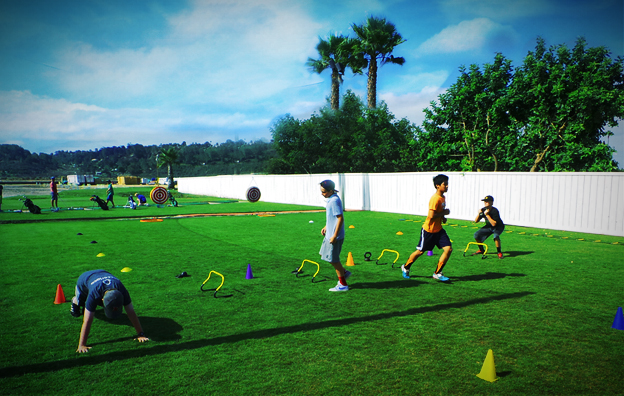IMPROVE MY GAME
Articles
Better is More
Tue Sep 2, 2014 by Dr. Bhrett McCabe

In the last ten years, there has been a dramatic shift in how the youth athlete develops and trains. From niche training facilities opening across each city to professional consultants marketing their skills with promises of running faster, hitting it further, and getting stronger, the backyards have transitioned quickly to formal, structured training programs. This specialization has resulted in youth athletes selecting and focusing on a primary sport and doing so year round. It is not only physical and technical skills training, as I have seen more and more requests for sports and performance psychology consultation for younger and younger athletes, looking to gain that additional edge. The “More is Better” mentality is truly driving parents, coaches, and players to push the physical and psychological limits.
There is little debate that early specialization and training optimization can have positive benefits on the athletic success of youth athletes in the short-term. Across the international Olympic training programs to sports such as gymnastics, tennis and golf where the difference between the “gifted” and the average is magnified, those with early focus and skill acquisition can distance themselves from the masses. In golf, a ten-year old child that can consistently hit the ball down the fairway and is proficient around the greens will dramatically differentiate themselves from the other children just learning to hit the golf ball. That separation can be empowering for the “great” player and parents, raising confidence and desire to compete more frequently, train harder, and train better. On the flipside, it can be punishing for those just learning the game to compete against the “professional” youth.
As a result, the urgency of specialization is resulting in more and more parents trying to ensure that their children have the early exposure and learn the necessary skills to “help” them be successful, all in a manner that is completely different than how they learned in their own childhood. It may not always be about guaranteeing a professional future, but instead having success in their formative childhood years. While the intent may be good, the long-term effects can be deleterious, both physically and mentally.
With the increased attention on youth sport training, there have been an increased number of articles and position statements cautioning against overtraining and injury occurrence. In a recent article on BleacherReport.com, Danny Knobler explored the increased prevalence of injuries in baseball, particularly the Tommy John surgery, and posited that the stronger, more experienced pitchers from throwing too much and too soon are simply wearing down. Dr. James Andrews, the world-renowned orthopedic surgeon and member of the TPI Medical Advisory Board, and pitching biomechanist Dr. Glenn Fleisig of the American Sports Medicine Institute (ASMI) have recently released a position statement on prevention of youth pitching injuries. Most recently, TPI advisor Milo Bryant provided engaging commentary of Daniel Coyle’s post from his website, www.thetalentcode.com on changing the approach from specialization to one of diversification.
While the literature is not extensive on the psychological impact of early specialization, Butcher and colleagues (2002) conducted a 10-year retrospective review of athletes that had dropped out of youth sports and found that early involvement and specialization actually lead to higher rates of psychological disengagement with the sport, resulting in the primary reason that youth athletes transfer to other sports. Russell and Limle (2013) later demonstrated that early specialization can actually sour the experience so dramatically that it has been associated with decreased participation for the athlete with other sports as well throughout their lifespan. Whether through burnout or limited social exposure and social skills development, early specialization is not just a threat to physical development but maybe more importantly, to the long-term psychological well-being.
As a licensed clinical psychologist and a sports and performance psychologist, I have significant concerns about the early specialization of the youth athlete; however, I do recognize that there may be some positives as well. The truth is that the trend towards specialized training and increased participation is not likely to go away, so it is important to adopt an enhanced coaching perspective with both athletes and their parents. The inherent desire of parents to provide every available resource is commendable and concerning in the same conversation. No youth athlete can attend practice or games without the logistical and financial support of their parents, but it must be kept in proper perspective. The youth athlete is ultimately responsible for making the decision to participate season to season, but they should not really be deciding when to attend practice to practice. A commitment is a commitment. Finally, parents, coaches, and players should never lose perspective on the reason to participate – to learn life skills, to compete, and to learn about themselves. Winning is fun and should not be forgotten, but it should not be placed ahead of development.
As a result, I propose the following factors for consideration when coaching an athlete that appears to be one of Early-Specialization:
- FUNCTION – As a parent or coach, the overall functioning of the athlete is more important than wins and losses. Be aware of their sleep habits, desire to practice, and social interactions. If the athlete is starting to refuse practice with increased frequency, it is a warning sign. Social isolation or limitations are also important to look for. Highly specialized athletes tend to build their social networks around their sport, and while it may have positive benefits during training, it can limit development of necessary social skills across the lifespan. As a coach, engage the player to try things that they do not normally do, such as playing opposite handed or solving problems on their own. Be slow to respond and allow the player to talk through their thoughts. Finally, try and find different topics for regular communication during the training sessions, from movies to music or recent events at school or other sporting events.
- FUN – The number of athletes truly moving from the youth developmental leagues to earn a living as a professional athlete are minimal. As coaches, it is important that the athlete, and the parents, enjoy the game, the training and competitions. Ultimately, when the athletic career is over, what will be remembered are the experiences and not the trophies. As a player progresses, they will eventually determine if the training and competition is more fun in one sport or another. That self-selection is likely going to be the decision point, so let it happen naturally. A golf swing is not going to ruin a baseball swing and vice versa. Encourage the athlete and parents to find other avenues for fun as well outside of their sport. Everyone needs a mental break from time to time.
- FAMILY – Since we are talking about youth sports, it is important to consider the entire family dynamic and how the youth athlete functions in that network. Who is driving the player and making the appointments? When it is apparent that the family structure and boundaries are blurred due to overdriven parents, it is important as a coach to establish clear expectations and demands with the entire family. It is not expected that you actually try and change the family dynamic, but instead of resisting it, try to understand it and coach through it. Many times recognizing the flex points will actually help you better than fighting against them.
- FAILURE – Few practice drills or competitive environments actually prepare athletes for failure. Since early specialization appears to be here to stay, do not be afraid to incorporate drills or games that the young athlete cannot win and must learn to find that grit and resiliency within themselves to proceed. Sandwich failure drills around other activities where the athlete gains mastery and confidence and avoid telling them which drills are failure-based drills until debriefing afterwards. During the post-drill discussion, ask them why they struggled, what internal tools they had to rely on, and what they can do to attempt the drill again. A great failure-based drill will not be easily solved, but with effort and consideration can be completed successfully. Feel free to reach out to me for drills of such nature.
- FINANCES – With the increased emphasis on specialization and involvement, finances can be a very stressful topic for the youth athlete. I have had several players tell me that they have to play well because their parents are struggling to pay entry fees and lessons, and open doors for college. That added pressure does not benefit the player, so if finances become an issue with parents, please have that conversation away from the player. Ensure that the parent never makes finances or costs a consideration for performance. Our society is stressful enough for our emerging generation that making them mature faster with concerns of the economics of sports is not necessary.
As a coach or parent, the job is greater than the sport – it is to develop the next generation in a constructive, challenging environment. Understanding the physical capabilities is only half the equation, as the psychological foundations are just as important. In a world of early specialization and increased overall participation from our youth athletes, it is more important to evolve our coaching to be better prepared to make a better, safer impact than fighting the model. Instead of “More is Better,” it is our job to make “Better is More”.

Bhrett McCabe, PhD is a licensed clinical psychologist and sports and performance psychologist in Birmingham, AL. Level 1 TPI Certified, he consults with players on the PGA and LPGA tour and is the Sports Psychologist for The University of Alabama Athletic Department. A four year letterman at Louisiana State University in baseball, he was a member of two NCAA National Championship teams and three Southeastern Conference championship teams. He completed his training in clinical psychology with a specialization in behavioral medicine/health psychology, and completed his internship at the Warren Alpert Medical School of Brown University in Providence, RI. He owns The MindSide, LLC, a performance consulting organization and can be found at www.bhrettmccabe.com
References:
Andrews, J. (2014). American Sports Medicine Institute Position Statement for Tommy John Injuries in Baseball Pitchers. http://www.asmi.org/research.php?page=research§ion=TJpositionstatement
Bryant, M. (2014). The trend towards early specialization. http://www.mytpi.com/articles/juniors/the_trend_towards_early_specialization
Butcher, J., Lindner, K.J., & Johns, D.P. (2002). Withdrawal from competitive youth spirit: A retrospective 10 year study. Journal of Sport Behavior, 25, 145-163.
Coyle, D. (2014). Hey parents: Quit raising specialists and start raising omnivores. http://thetalentcode.com/2014/02/06/hey-parents-quit-raising-specialists-and-start-raising-omnivores/
Knobler, D. (2014). Baseball’s pitching dilemma: “Too hard, too fast, too much, too soon.” Published online at www.bleacherreport.com. Link to article - http://bleacherreport.com/articles/2080837-baseballs-pitching-dilemma-too-hard-too-fast-too-much-too-soon
Russell, W.D. & Limle, A.N. (2013). The relationship between youth sport specialization and involvement in sport and physical activity in young adulthood. Journal of Sport Behavior, 36, 82-98.